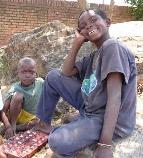Recreational Activities
 Chimwemwe’s primary beneficiaries are the children who live and/or who beg on the streets of Malawi, and their families. treet children are one of the poorest and most vulnerable groups in Malawi. On the streets, children face dangers of sexual abuse, beatings and imprisonment and the lure of more dangerous forms of child labour such as carrying heavy loads, drug dealing and theft. Much of Chimwemwe's work involves the development of trust between the children and the staff of Chimwemwe.
Chimwemwe’s primary beneficiaries are the children who live and/or who beg on the streets of Malawi, and their families. treet children are one of the poorest and most vulnerable groups in Malawi. On the streets, children face dangers of sexual abuse, beatings and imprisonment and the lure of more dangerous forms of child labour such as carrying heavy loads, drug dealing and theft. Much of Chimwemwe's work involves the development of trust between the children and the staff of Chimwemwe.
Chimwemwe will make contact with newcomers on the street and establish an entry point for Chimwemwe activities and build strong relationships of mutual understanding and trust between workers and children, and among the children themselves. In addition, the project offers counselling to children and the ability to be involved in social and recreational activities.
Chimwemwe will support Recreational Activities in the following ways:
Building relationships of trust
- Carrying out street outreach each day to identify and build relationships with new children
- Giving appropriate follow-up to newcomers, finding out as much as possible about them, and identifying ways in which to help them
- Linking new children with a worker who will act as a key contact point and mentor for them
- Staff and children sharing meals together at least three times a week
- Providing opportunities and resources for children to play indoor and outdoor games both together with staff, and to organize their own games
- Involving children in singing, playing musical instruments and traditional dances
- Encouraging children to buy, prepare and cook other meals together
Counselling
- Counselling the children, both individually and in groups, helping them to find solutions to their problems and to make clear plans for the future
- Exploring peer counselling systems so that other children can benefit from fellow children that have succeeded in changing aspects of their behaviour or completed a skills training programme and are earning their own money
- Developing some children as leaders to act as role-models to others
- Ensuring that children have access to opportunities for spiritual growth through materials and their respective churches or places of worship
- Giving children the opportunity to participate in a Chimwemwe day retreat to build confidence and self esteem
- Encouraging churches to sponsor children for church youth events/conferences so that the children can mix socially with other young people and learn more about their faith
- Inviting role models to talk with children to motivate them and think big with their ambitions
Recreation and social development
- Involving children in planning, implementation and reviews, using PLA approaches like bean ranking, social mapping, preference ranking, matrices, Venn diagrams
- Carrying out special events and recreational/educational trips so that children develop an understanding of things around them
- Carrying out child group therapy retreats for children in upper classes (standard 7 and 8) and secondary school children to build confidence and responsibility
- Increasing the provision of play equipment, especially outdoor to encourage socialization for all children
- Encouraging children to participate in friendly and league football games as part of socialization and abstinence from immoral behaviour
- Identifying under-14/16 outstanding players for trials/attachment amongst junior league teams so that football skills are promoted in order to build professionalism in the children
- Holding a sports competition of football/netball with other children from various communities as part of relationship building
- Initiating a recreation centre in one of the communities where most children come from to encourage retention of children in their communities, but also to encourage them to use their time productively